Importance of Management Accounting Reports
VerifiedAdded on 2020/07/23
|14
|4222
|174
AI Summary
The provided report focuses on the significance of management accounting in various contexts, including planning tools used in budgetary control. It highlights the importance of effective management accounting systems, different types of management accounting systems, and essential requirements. The report also discusses cost-evaluating techniques, advantages, and disadvantages of planning tools used in budgetary control.
Contribute Materials
Your contribution can guide someone’s learning journey. Share your
documents today.
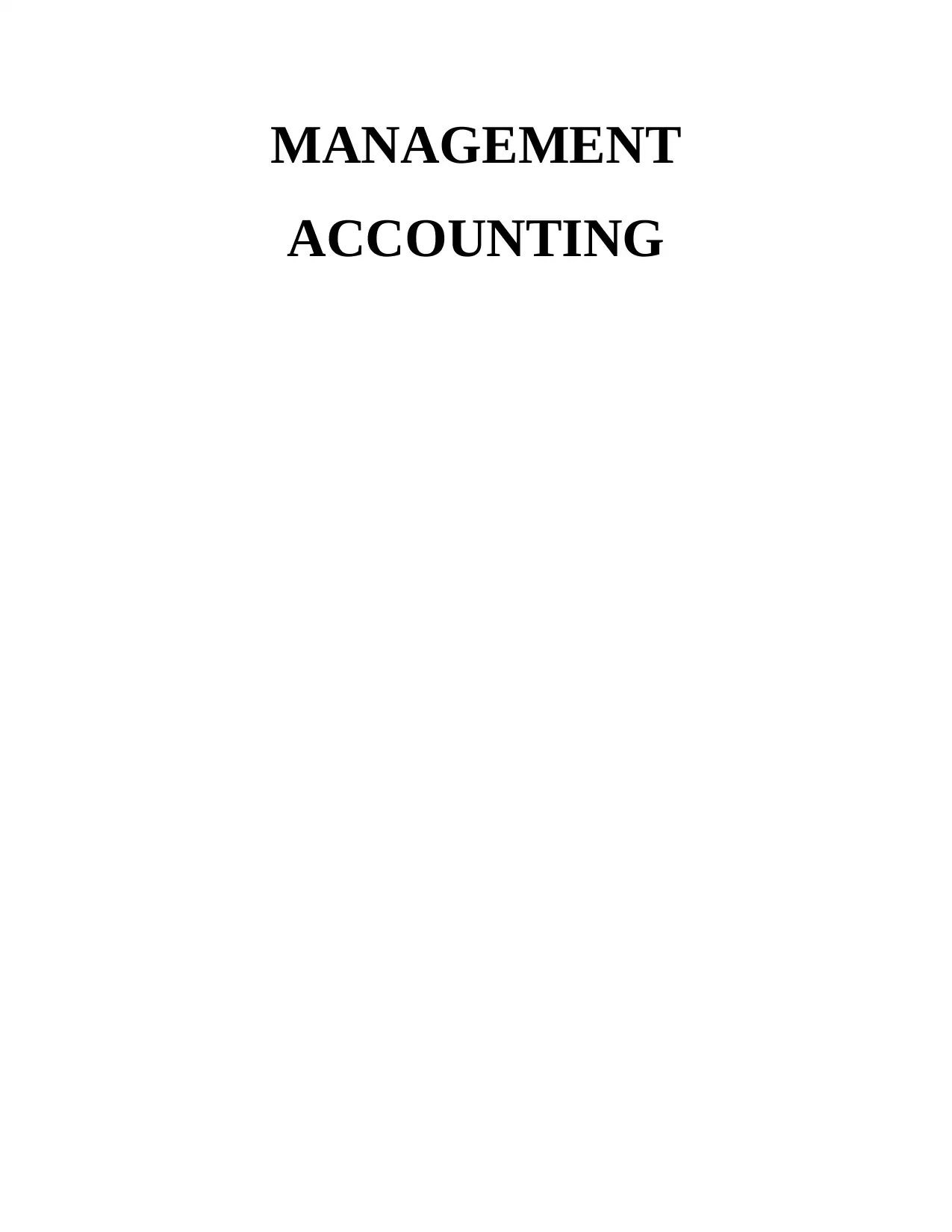
MANAGEMENT
ACCOUNTING
ACCOUNTING
Secure Best Marks with AI Grader
Need help grading? Try our AI Grader for instant feedback on your assignments.
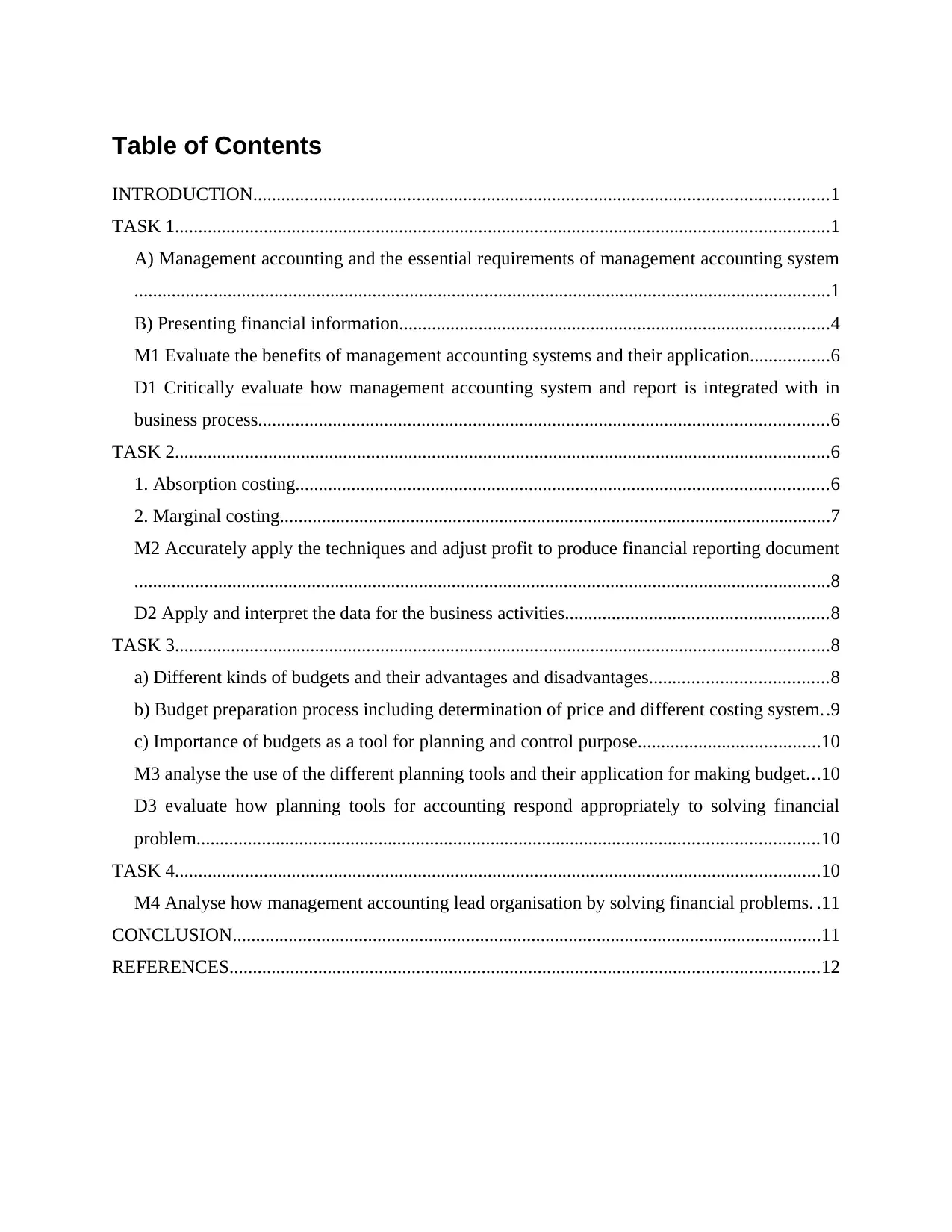
Table of Contents
INTRODUCTION...........................................................................................................................1
TASK 1............................................................................................................................................1
A) Management accounting and the essential requirements of management accounting system
.....................................................................................................................................................1
B) Presenting financial information............................................................................................4
M1 Evaluate the benefits of management accounting systems and their application.................6
D1 Critically evaluate how management accounting system and report is integrated with in
business process..........................................................................................................................6
TASK 2............................................................................................................................................6
1. Absorption costing..................................................................................................................6
2. Marginal costing......................................................................................................................7
M2 Accurately apply the techniques and adjust profit to produce financial reporting document
.....................................................................................................................................................8
D2 Apply and interpret the data for the business activities........................................................8
TASK 3............................................................................................................................................8
a) Different kinds of budgets and their advantages and disadvantages......................................8
b) Budget preparation process including determination of price and different costing system..9
c) Importance of budgets as a tool for planning and control purpose.......................................10
M3 analyse the use of the different planning tools and their application for making budget...10
D3 evaluate how planning tools for accounting respond appropriately to solving financial
problem.....................................................................................................................................10
TASK 4..........................................................................................................................................10
M4 Analyse how management accounting lead organisation by solving financial problems. .11
CONCLUSION..............................................................................................................................11
REFERENCES..............................................................................................................................12
INTRODUCTION...........................................................................................................................1
TASK 1............................................................................................................................................1
A) Management accounting and the essential requirements of management accounting system
.....................................................................................................................................................1
B) Presenting financial information............................................................................................4
M1 Evaluate the benefits of management accounting systems and their application.................6
D1 Critically evaluate how management accounting system and report is integrated with in
business process..........................................................................................................................6
TASK 2............................................................................................................................................6
1. Absorption costing..................................................................................................................6
2. Marginal costing......................................................................................................................7
M2 Accurately apply the techniques and adjust profit to produce financial reporting document
.....................................................................................................................................................8
D2 Apply and interpret the data for the business activities........................................................8
TASK 3............................................................................................................................................8
a) Different kinds of budgets and their advantages and disadvantages......................................8
b) Budget preparation process including determination of price and different costing system..9
c) Importance of budgets as a tool for planning and control purpose.......................................10
M3 analyse the use of the different planning tools and their application for making budget...10
D3 evaluate how planning tools for accounting respond appropriately to solving financial
problem.....................................................................................................................................10
TASK 4..........................................................................................................................................10
M4 Analyse how management accounting lead organisation by solving financial problems. .11
CONCLUSION..............................................................................................................................11
REFERENCES..............................................................................................................................12
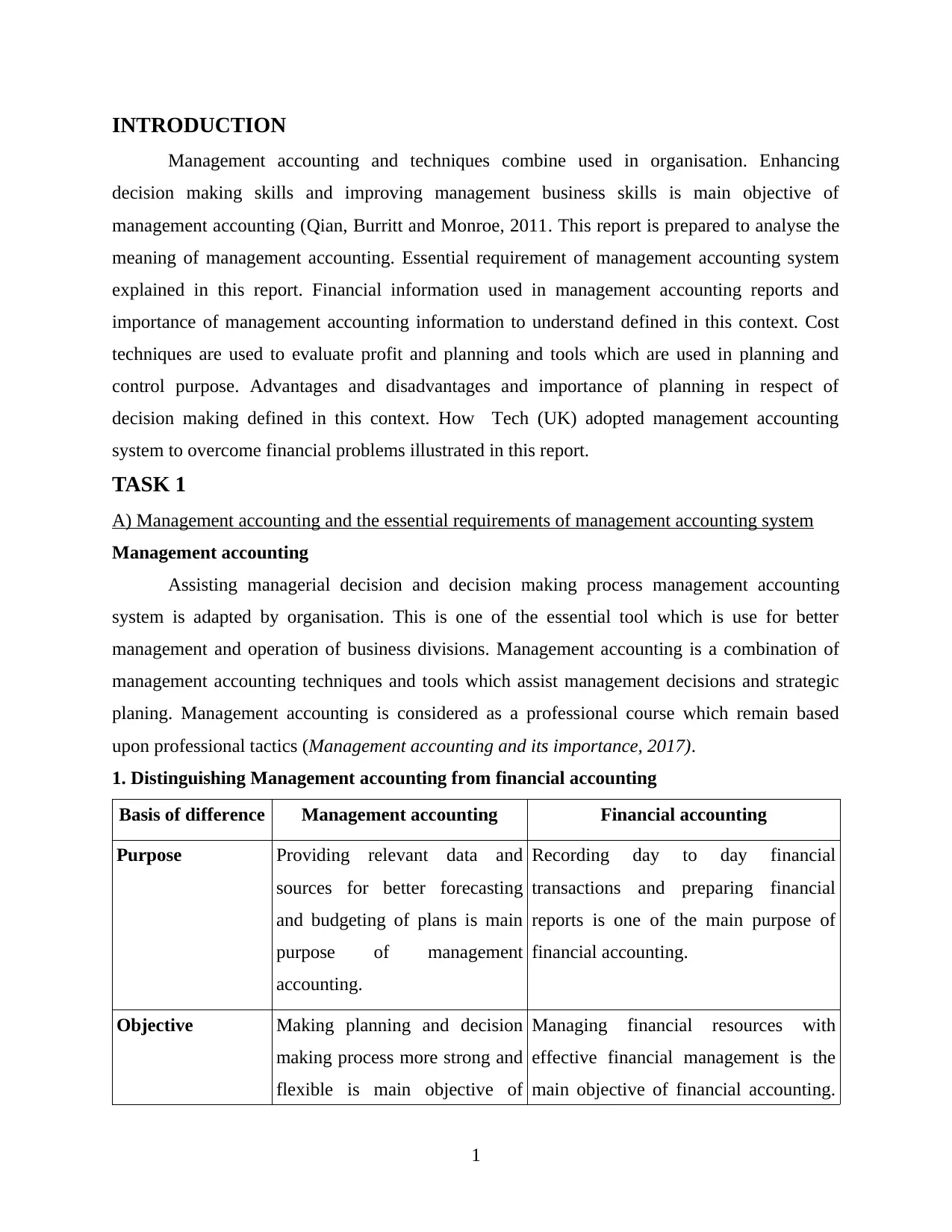
INTRODUCTION
Management accounting and techniques combine used in organisation. Enhancing
decision making skills and improving management business skills is main objective of
management accounting (Qian, Burritt and Monroe, 2011. This report is prepared to analyse the
meaning of management accounting. Essential requirement of management accounting system
explained in this report. Financial information used in management accounting reports and
importance of management accounting information to understand defined in this context. Cost
techniques are used to evaluate profit and planning and tools which are used in planning and
control purpose. Advantages and disadvantages and importance of planning in respect of
decision making defined in this context. How Tech (UK) adopted management accounting
system to overcome financial problems illustrated in this report.
TASK 1
A) Management accounting and the essential requirements of management accounting system
Management accounting
Assisting managerial decision and decision making process management accounting
system is adapted by organisation. This is one of the essential tool which is use for better
management and operation of business divisions. Management accounting is a combination of
management accounting techniques and tools which assist management decisions and strategic
planing. Management accounting is considered as a professional course which remain based
upon professional tactics (Management accounting and its importance, 2017).
1. Distinguishing Management accounting from financial accounting
Basis of difference Management accounting Financial accounting
Purpose Providing relevant data and
sources for better forecasting
and budgeting of plans is main
purpose of management
accounting.
Recording day to day financial
transactions and preparing financial
reports is one of the main purpose of
financial accounting.
Objective Making planning and decision
making process more strong and
flexible is main objective of
Managing financial resources with
effective financial management is the
main objective of financial accounting.
1
Management accounting and techniques combine used in organisation. Enhancing
decision making skills and improving management business skills is main objective of
management accounting (Qian, Burritt and Monroe, 2011. This report is prepared to analyse the
meaning of management accounting. Essential requirement of management accounting system
explained in this report. Financial information used in management accounting reports and
importance of management accounting information to understand defined in this context. Cost
techniques are used to evaluate profit and planning and tools which are used in planning and
control purpose. Advantages and disadvantages and importance of planning in respect of
decision making defined in this context. How Tech (UK) adopted management accounting
system to overcome financial problems illustrated in this report.
TASK 1
A) Management accounting and the essential requirements of management accounting system
Management accounting
Assisting managerial decision and decision making process management accounting
system is adapted by organisation. This is one of the essential tool which is use for better
management and operation of business divisions. Management accounting is a combination of
management accounting techniques and tools which assist management decisions and strategic
planing. Management accounting is considered as a professional course which remain based
upon professional tactics (Management accounting and its importance, 2017).
1. Distinguishing Management accounting from financial accounting
Basis of difference Management accounting Financial accounting
Purpose Providing relevant data and
sources for better forecasting
and budgeting of plans is main
purpose of management
accounting.
Recording day to day financial
transactions and preparing financial
reports is one of the main purpose of
financial accounting.
Objective Making planning and decision
making process more strong and
flexible is main objective of
Managing financial resources with
effective financial management is the
main objective of financial accounting.
1
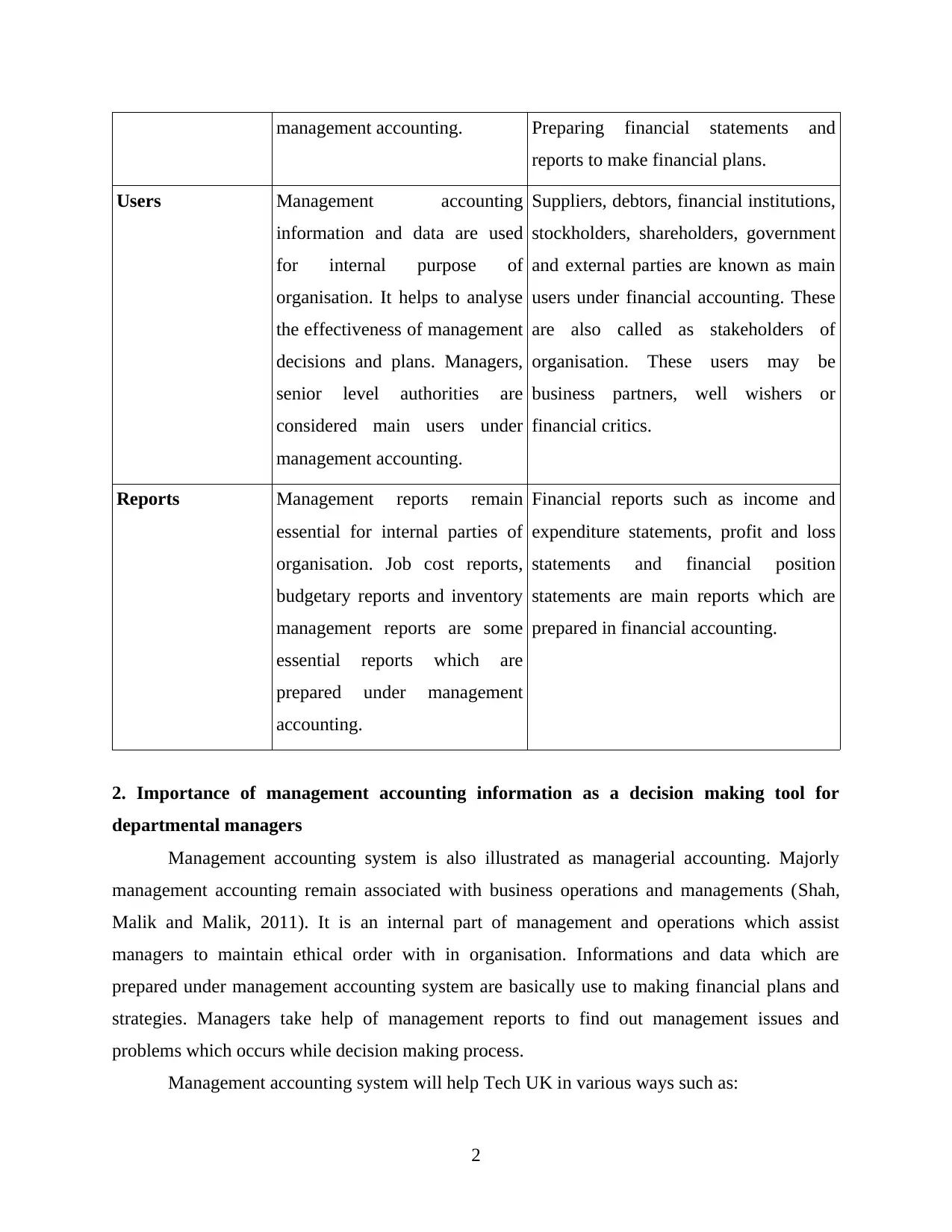
management accounting. Preparing financial statements and
reports to make financial plans.
Users Management accounting
information and data are used
for internal purpose of
organisation. It helps to analyse
the effectiveness of management
decisions and plans. Managers,
senior level authorities are
considered main users under
management accounting.
Suppliers, debtors, financial institutions,
stockholders, shareholders, government
and external parties are known as main
users under financial accounting. These
are also called as stakeholders of
organisation. These users may be
business partners, well wishers or
financial critics.
Reports Management reports remain
essential for internal parties of
organisation. Job cost reports,
budgetary reports and inventory
management reports are some
essential reports which are
prepared under management
accounting.
Financial reports such as income and
expenditure statements, profit and loss
statements and financial position
statements are main reports which are
prepared in financial accounting.
2. Importance of management accounting information as a decision making tool for
departmental managers
Management accounting system is also illustrated as managerial accounting. Majorly
management accounting remain associated with business operations and managements (Shah,
Malik and Malik, 2011). It is an internal part of management and operations which assist
managers to maintain ethical order with in organisation. Informations and data which are
prepared under management accounting system are basically use to making financial plans and
strategies. Managers take help of management reports to find out management issues and
problems which occurs while decision making process.
Management accounting system will help Tech UK in various ways such as:
2
reports to make financial plans.
Users Management accounting
information and data are used
for internal purpose of
organisation. It helps to analyse
the effectiveness of management
decisions and plans. Managers,
senior level authorities are
considered main users under
management accounting.
Suppliers, debtors, financial institutions,
stockholders, shareholders, government
and external parties are known as main
users under financial accounting. These
are also called as stakeholders of
organisation. These users may be
business partners, well wishers or
financial critics.
Reports Management reports remain
essential for internal parties of
organisation. Job cost reports,
budgetary reports and inventory
management reports are some
essential reports which are
prepared under management
accounting.
Financial reports such as income and
expenditure statements, profit and loss
statements and financial position
statements are main reports which are
prepared in financial accounting.
2. Importance of management accounting information as a decision making tool for
departmental managers
Management accounting system is also illustrated as managerial accounting. Majorly
management accounting remain associated with business operations and managements (Shah,
Malik and Malik, 2011). It is an internal part of management and operations which assist
managers to maintain ethical order with in organisation. Informations and data which are
prepared under management accounting system are basically use to making financial plans and
strategies. Managers take help of management reports to find out management issues and
problems which occurs while decision making process.
Management accounting system will help Tech UK in various ways such as:
2
Secure Best Marks with AI Grader
Need help grading? Try our AI Grader for instant feedback on your assignments.
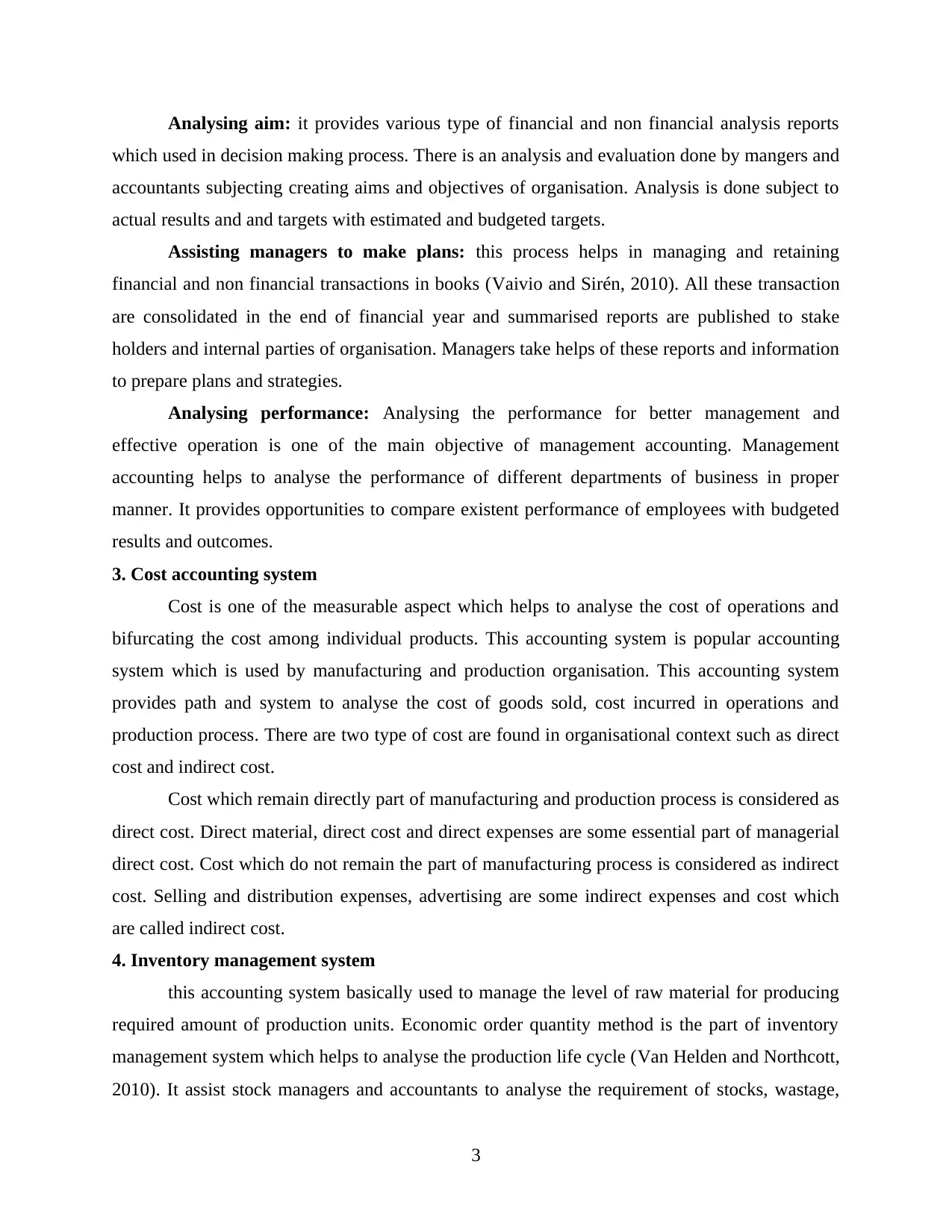
Analysing aim: it provides various type of financial and non financial analysis reports
which used in decision making process. There is an analysis and evaluation done by mangers and
accountants subjecting creating aims and objectives of organisation. Analysis is done subject to
actual results and and targets with estimated and budgeted targets.
Assisting managers to make plans: this process helps in managing and retaining
financial and non financial transactions in books (Vaivio and Sirén, 2010). All these transaction
are consolidated in the end of financial year and summarised reports are published to stake
holders and internal parties of organisation. Managers take helps of these reports and information
to prepare plans and strategies.
Analysing performance: Analysing the performance for better management and
effective operation is one of the main objective of management accounting. Management
accounting helps to analyse the performance of different departments of business in proper
manner. It provides opportunities to compare existent performance of employees with budgeted
results and outcomes.
3. Cost accounting system
Cost is one of the measurable aspect which helps to analyse the cost of operations and
bifurcating the cost among individual products. This accounting system is popular accounting
system which is used by manufacturing and production organisation. This accounting system
provides path and system to analyse the cost of goods sold, cost incurred in operations and
production process. There are two type of cost are found in organisational context such as direct
cost and indirect cost.
Cost which remain directly part of manufacturing and production process is considered as
direct cost. Direct material, direct cost and direct expenses are some essential part of managerial
direct cost. Cost which do not remain the part of manufacturing process is considered as indirect
cost. Selling and distribution expenses, advertising are some indirect expenses and cost which
are called indirect cost.
4. Inventory management system
this accounting system basically used to manage the level of raw material for producing
required amount of production units. Economic order quantity method is the part of inventory
management system which helps to analyse the production life cycle (Van Helden and Northcott,
2010). It assist stock managers and accountants to analyse the requirement of stocks, wastage,
3
which used in decision making process. There is an analysis and evaluation done by mangers and
accountants subjecting creating aims and objectives of organisation. Analysis is done subject to
actual results and and targets with estimated and budgeted targets.
Assisting managers to make plans: this process helps in managing and retaining
financial and non financial transactions in books (Vaivio and Sirén, 2010). All these transaction
are consolidated in the end of financial year and summarised reports are published to stake
holders and internal parties of organisation. Managers take helps of these reports and information
to prepare plans and strategies.
Analysing performance: Analysing the performance for better management and
effective operation is one of the main objective of management accounting. Management
accounting helps to analyse the performance of different departments of business in proper
manner. It provides opportunities to compare existent performance of employees with budgeted
results and outcomes.
3. Cost accounting system
Cost is one of the measurable aspect which helps to analyse the cost of operations and
bifurcating the cost among individual products. This accounting system is popular accounting
system which is used by manufacturing and production organisation. This accounting system
provides path and system to analyse the cost of goods sold, cost incurred in operations and
production process. There are two type of cost are found in organisational context such as direct
cost and indirect cost.
Cost which remain directly part of manufacturing and production process is considered as
direct cost. Direct material, direct cost and direct expenses are some essential part of managerial
direct cost. Cost which do not remain the part of manufacturing process is considered as indirect
cost. Selling and distribution expenses, advertising are some indirect expenses and cost which
are called indirect cost.
4. Inventory management system
this accounting system basically used to manage the level of raw material for producing
required amount of production units. Economic order quantity method is the part of inventory
management system which helps to analyse the production life cycle (Van Helden and Northcott,
2010). It assist stock managers and accountants to analyse the requirement of stocks, wastage,
3
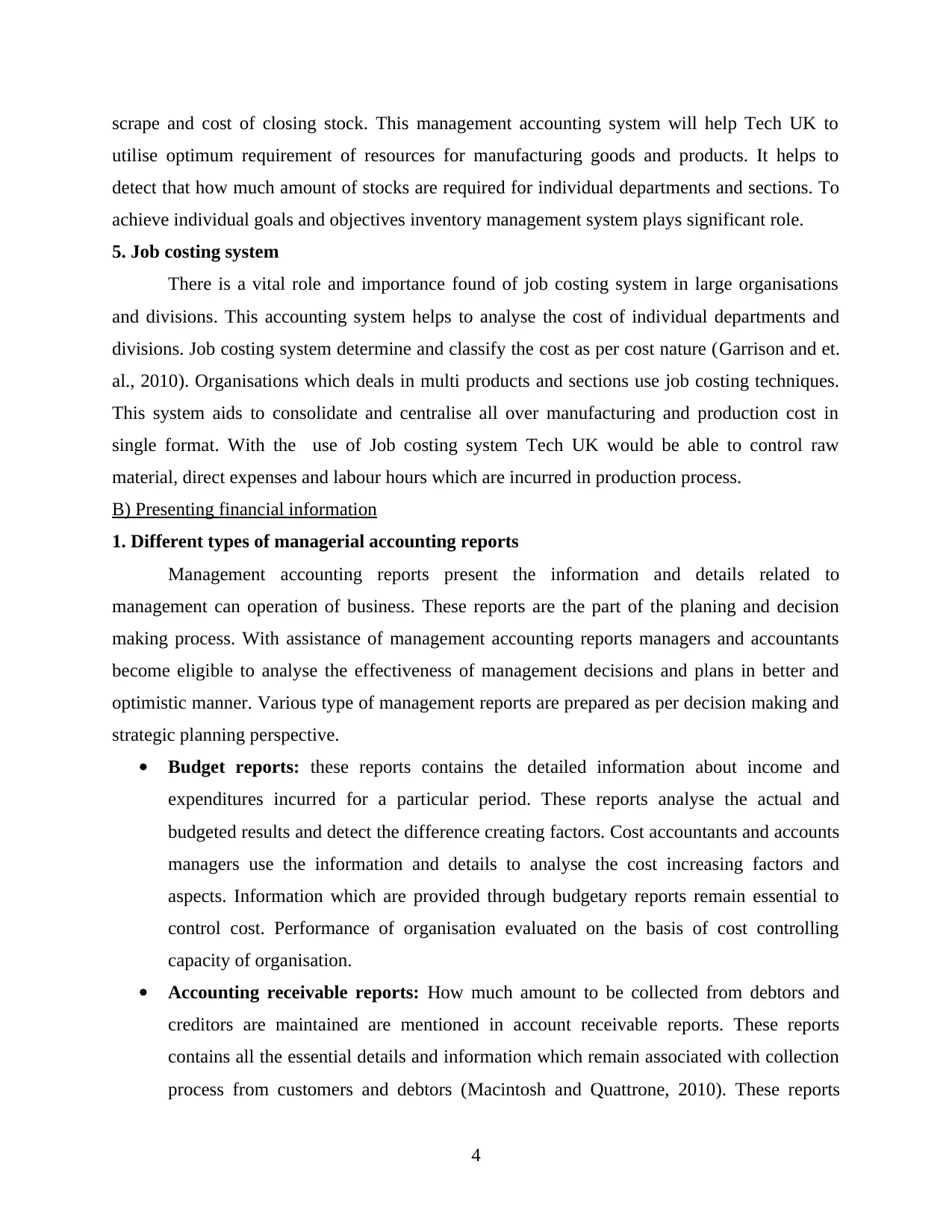
scrape and cost of closing stock. This management accounting system will help Tech UK to
utilise optimum requirement of resources for manufacturing goods and products. It helps to
detect that how much amount of stocks are required for individual departments and sections. To
achieve individual goals and objectives inventory management system plays significant role.
5. Job costing system
There is a vital role and importance found of job costing system in large organisations
and divisions. This accounting system helps to analyse the cost of individual departments and
divisions. Job costing system determine and classify the cost as per cost nature (Garrison and et.
al., 2010). Organisations which deals in multi products and sections use job costing techniques.
This system aids to consolidate and centralise all over manufacturing and production cost in
single format. With the use of Job costing system Tech UK would be able to control raw
material, direct expenses and labour hours which are incurred in production process.
B) Presenting financial information
1. Different types of managerial accounting reports
Management accounting reports present the information and details related to
management can operation of business. These reports are the part of the planing and decision
making process. With assistance of management accounting reports managers and accountants
become eligible to analyse the effectiveness of management decisions and plans in better and
optimistic manner. Various type of management reports are prepared as per decision making and
strategic planning perspective.
Budget reports: these reports contains the detailed information about income and
expenditures incurred for a particular period. These reports analyse the actual and
budgeted results and detect the difference creating factors. Cost accountants and accounts
managers use the information and details to analyse the cost increasing factors and
aspects. Information which are provided through budgetary reports remain essential to
control cost. Performance of organisation evaluated on the basis of cost controlling
capacity of organisation.
Accounting receivable reports: How much amount to be collected from debtors and
creditors are maintained are mentioned in account receivable reports. These reports
contains all the essential details and information which remain associated with collection
process from customers and debtors (Macintosh and Quattrone, 2010). These reports
4
utilise optimum requirement of resources for manufacturing goods and products. It helps to
detect that how much amount of stocks are required for individual departments and sections. To
achieve individual goals and objectives inventory management system plays significant role.
5. Job costing system
There is a vital role and importance found of job costing system in large organisations
and divisions. This accounting system helps to analyse the cost of individual departments and
divisions. Job costing system determine and classify the cost as per cost nature (Garrison and et.
al., 2010). Organisations which deals in multi products and sections use job costing techniques.
This system aids to consolidate and centralise all over manufacturing and production cost in
single format. With the use of Job costing system Tech UK would be able to control raw
material, direct expenses and labour hours which are incurred in production process.
B) Presenting financial information
1. Different types of managerial accounting reports
Management accounting reports present the information and details related to
management can operation of business. These reports are the part of the planing and decision
making process. With assistance of management accounting reports managers and accountants
become eligible to analyse the effectiveness of management decisions and plans in better and
optimistic manner. Various type of management reports are prepared as per decision making and
strategic planning perspective.
Budget reports: these reports contains the detailed information about income and
expenditures incurred for a particular period. These reports analyse the actual and
budgeted results and detect the difference creating factors. Cost accountants and accounts
managers use the information and details to analyse the cost increasing factors and
aspects. Information which are provided through budgetary reports remain essential to
control cost. Performance of organisation evaluated on the basis of cost controlling
capacity of organisation.
Accounting receivable reports: How much amount to be collected from debtors and
creditors are maintained are mentioned in account receivable reports. These reports
contains all the essential details and information which remain associated with collection
process from customers and debtors (Macintosh and Quattrone, 2010). These reports
4
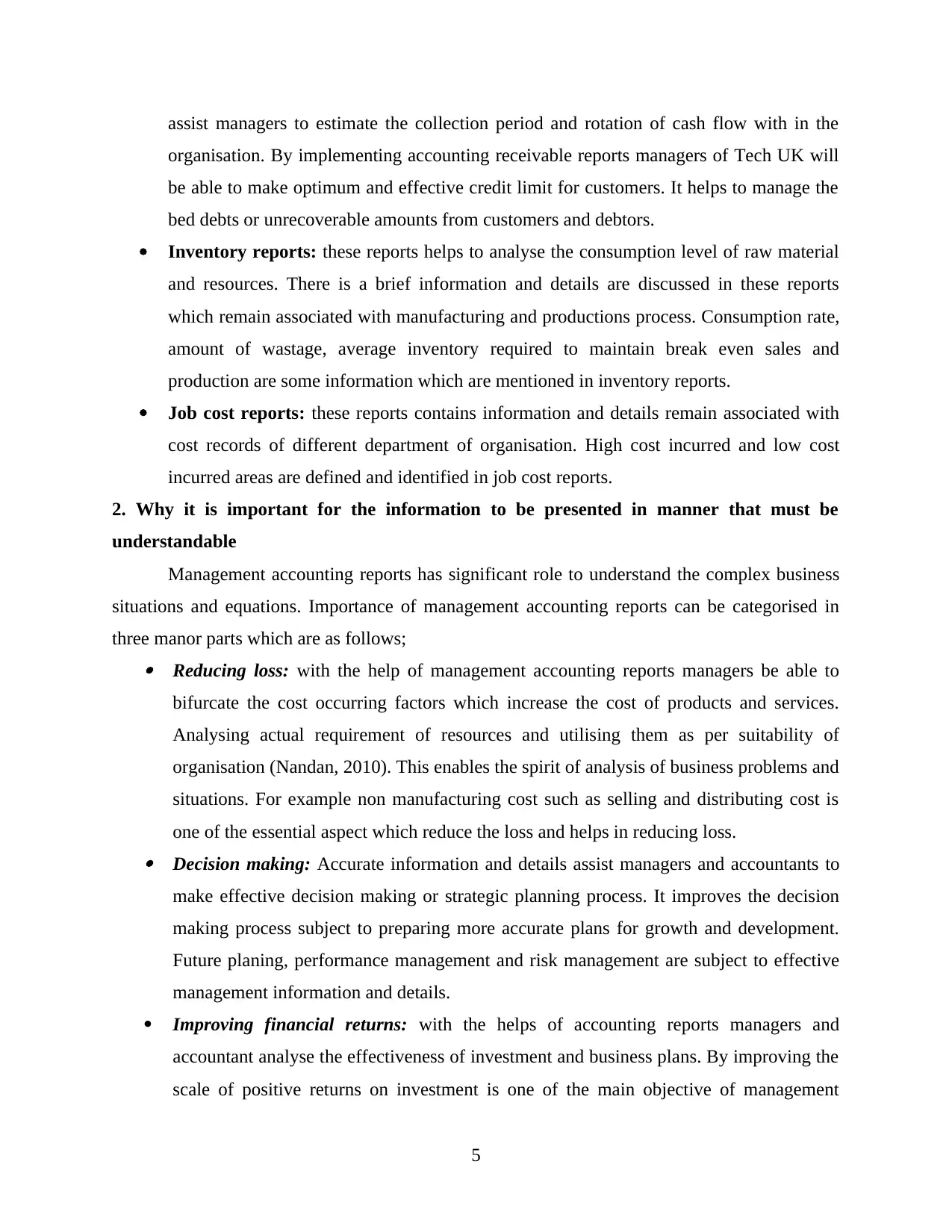
assist managers to estimate the collection period and rotation of cash flow with in the
organisation. By implementing accounting receivable reports managers of Tech UK will
be able to make optimum and effective credit limit for customers. It helps to manage the
bed debts or unrecoverable amounts from customers and debtors.
Inventory reports: these reports helps to analyse the consumption level of raw material
and resources. There is a brief information and details are discussed in these reports
which remain associated with manufacturing and productions process. Consumption rate,
amount of wastage, average inventory required to maintain break even sales and
production are some information which are mentioned in inventory reports.
Job cost reports: these reports contains information and details remain associated with
cost records of different department of organisation. High cost incurred and low cost
incurred areas are defined and identified in job cost reports.
2. Why it is important for the information to be presented in manner that must be
understandable
Management accounting reports has significant role to understand the complex business
situations and equations. Importance of management accounting reports can be categorised in
three manor parts which are as follows; Reducing loss: with the help of management accounting reports managers be able to
bifurcate the cost occurring factors which increase the cost of products and services.
Analysing actual requirement of resources and utilising them as per suitability of
organisation (Nandan, 2010). This enables the spirit of analysis of business problems and
situations. For example non manufacturing cost such as selling and distributing cost is
one of the essential aspect which reduce the loss and helps in reducing loss. Decision making: Accurate information and details assist managers and accountants to
make effective decision making or strategic planning process. It improves the decision
making process subject to preparing more accurate plans for growth and development.
Future planing, performance management and risk management are subject to effective
management information and details.
Improving financial returns: with the helps of accounting reports managers and
accountant analyse the effectiveness of investment and business plans. By improving the
scale of positive returns on investment is one of the main objective of management
5
organisation. By implementing accounting receivable reports managers of Tech UK will
be able to make optimum and effective credit limit for customers. It helps to manage the
bed debts or unrecoverable amounts from customers and debtors.
Inventory reports: these reports helps to analyse the consumption level of raw material
and resources. There is a brief information and details are discussed in these reports
which remain associated with manufacturing and productions process. Consumption rate,
amount of wastage, average inventory required to maintain break even sales and
production are some information which are mentioned in inventory reports.
Job cost reports: these reports contains information and details remain associated with
cost records of different department of organisation. High cost incurred and low cost
incurred areas are defined and identified in job cost reports.
2. Why it is important for the information to be presented in manner that must be
understandable
Management accounting reports has significant role to understand the complex business
situations and equations. Importance of management accounting reports can be categorised in
three manor parts which are as follows; Reducing loss: with the help of management accounting reports managers be able to
bifurcate the cost occurring factors which increase the cost of products and services.
Analysing actual requirement of resources and utilising them as per suitability of
organisation (Nandan, 2010). This enables the spirit of analysis of business problems and
situations. For example non manufacturing cost such as selling and distributing cost is
one of the essential aspect which reduce the loss and helps in reducing loss. Decision making: Accurate information and details assist managers and accountants to
make effective decision making or strategic planning process. It improves the decision
making process subject to preparing more accurate plans for growth and development.
Future planing, performance management and risk management are subject to effective
management information and details.
Improving financial returns: with the helps of accounting reports managers and
accountant analyse the effectiveness of investment and business plans. By improving the
scale of positive returns on investment is one of the main objective of management
5
Paraphrase This Document
Need a fresh take? Get an instant paraphrase of this document with our AI Paraphraser
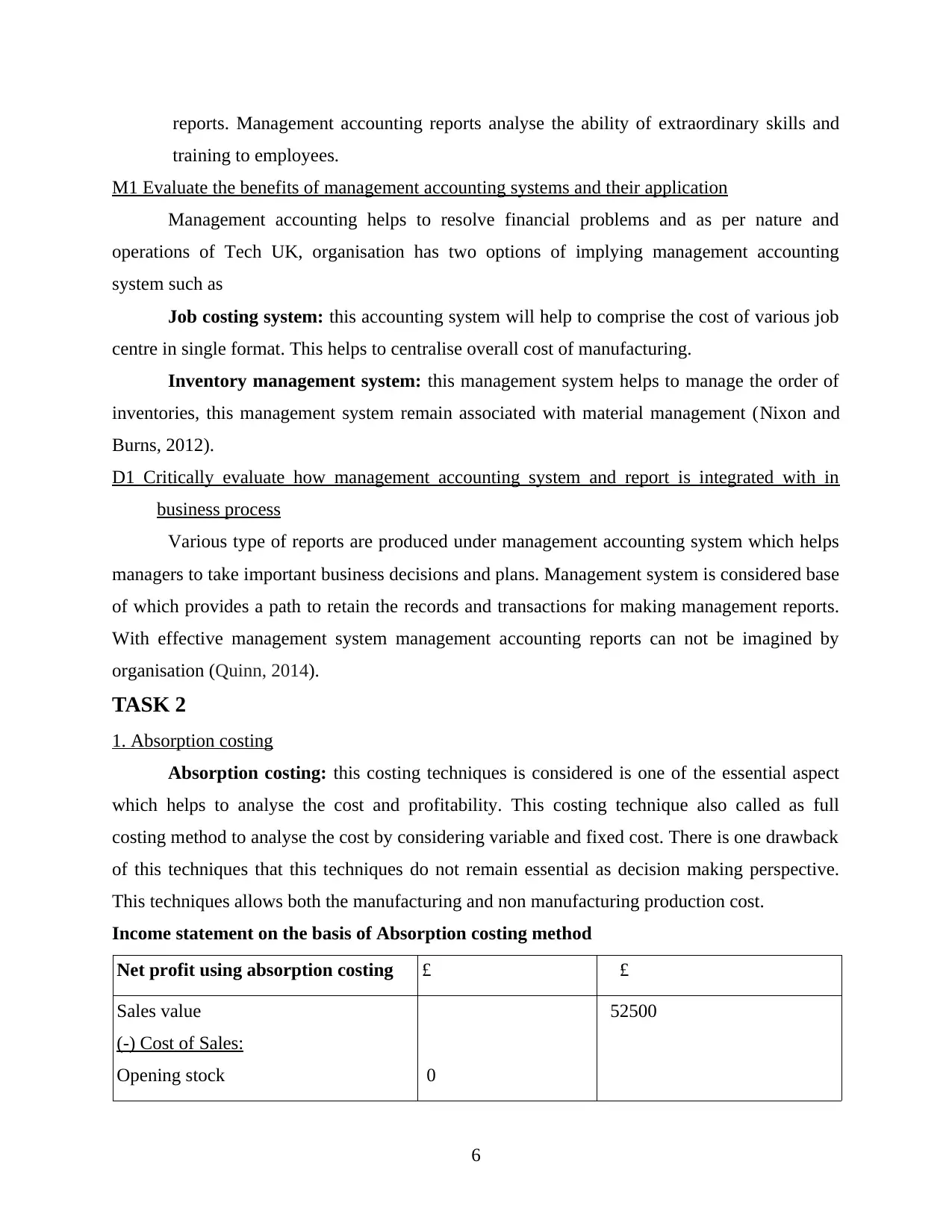
reports. Management accounting reports analyse the ability of extraordinary skills and
training to employees.
M1 Evaluate the benefits of management accounting systems and their application
Management accounting helps to resolve financial problems and as per nature and
operations of Tech UK, organisation has two options of implying management accounting
system such as
Job costing system: this accounting system will help to comprise the cost of various job
centre in single format. This helps to centralise overall cost of manufacturing.
Inventory management system: this management system helps to manage the order of
inventories, this management system remain associated with material management (Nixon and
Burns, 2012).
D1 Critically evaluate how management accounting system and report is integrated with in
business process
Various type of reports are produced under management accounting system which helps
managers to take important business decisions and plans. Management system is considered base
of which provides a path to retain the records and transactions for making management reports.
With effective management system management accounting reports can not be imagined by
organisation (Quinn, 2014).
TASK 2
1. Absorption costing
Absorption costing: this costing techniques is considered is one of the essential aspect
which helps to analyse the cost and profitability. This costing technique also called as full
costing method to analyse the cost by considering variable and fixed cost. There is one drawback
of this techniques that this techniques do not remain essential as decision making perspective.
This techniques allows both the manufacturing and non manufacturing production cost.
Income statement on the basis of Absorption costing method
Net profit using absorption costing £ £
Sales value
(-) Cost of Sales:
Opening stock 0
52500
6
training to employees.
M1 Evaluate the benefits of management accounting systems and their application
Management accounting helps to resolve financial problems and as per nature and
operations of Tech UK, organisation has two options of implying management accounting
system such as
Job costing system: this accounting system will help to comprise the cost of various job
centre in single format. This helps to centralise overall cost of manufacturing.
Inventory management system: this management system helps to manage the order of
inventories, this management system remain associated with material management (Nixon and
Burns, 2012).
D1 Critically evaluate how management accounting system and report is integrated with in
business process
Various type of reports are produced under management accounting system which helps
managers to take important business decisions and plans. Management system is considered base
of which provides a path to retain the records and transactions for making management reports.
With effective management system management accounting reports can not be imagined by
organisation (Quinn, 2014).
TASK 2
1. Absorption costing
Absorption costing: this costing techniques is considered is one of the essential aspect
which helps to analyse the cost and profitability. This costing technique also called as full
costing method to analyse the cost by considering variable and fixed cost. There is one drawback
of this techniques that this techniques do not remain essential as decision making perspective.
This techniques allows both the manufacturing and non manufacturing production cost.
Income statement on the basis of Absorption costing method
Net profit using absorption costing £ £
Sales value
(-) Cost of Sales:
Opening stock 0
52500
6
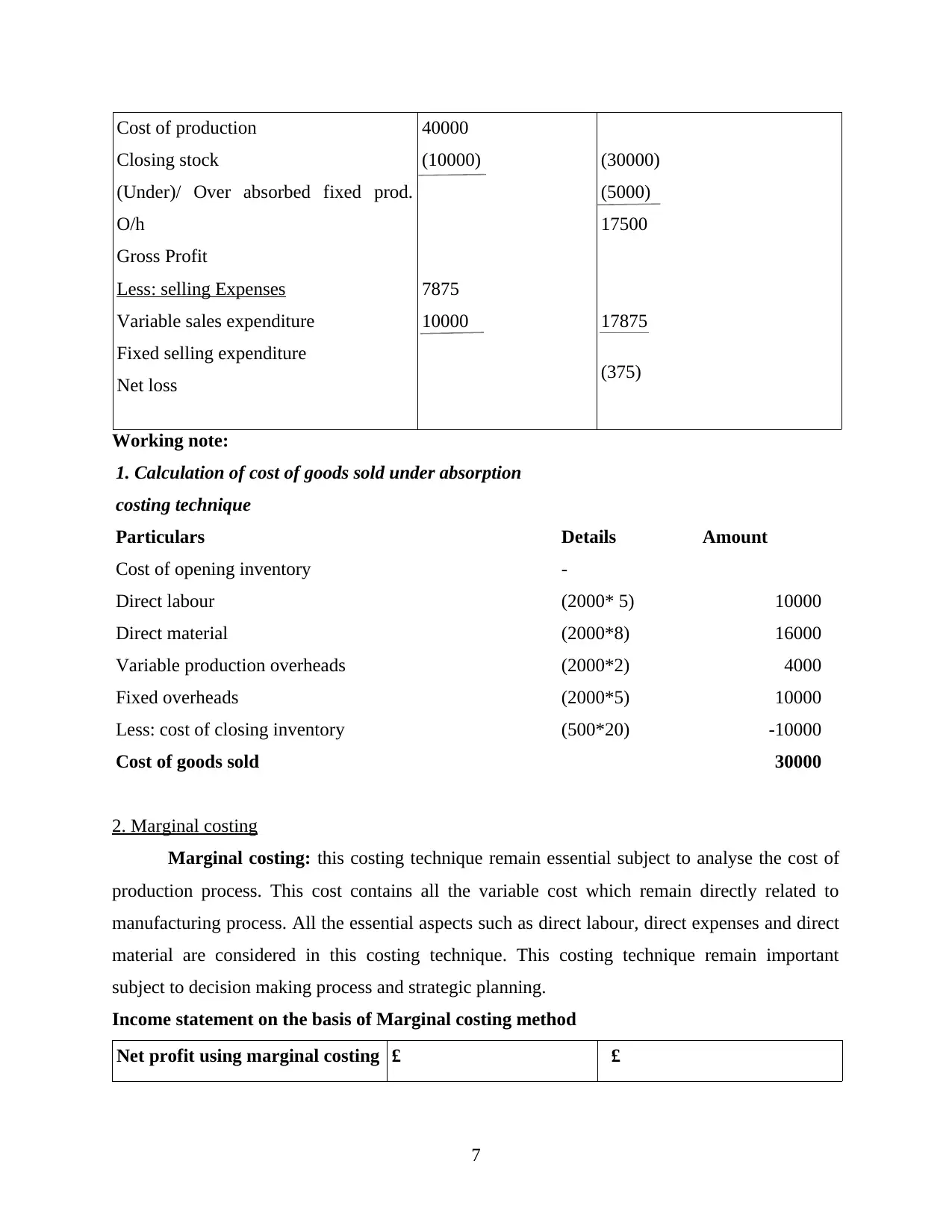
Cost of production
Closing stock
(Under)/ Over absorbed fixed prod.
O/h
Gross Profit
Less: selling Expenses
Variable sales expenditure
Fixed selling expenditure
Net loss
40000
(10000)
7875
10000
(30000)
(5000)
17500
17875
(375)
Working note:
1. Calculation of cost of goods sold under absorption
costing technique
Particulars Details Amount
Cost of opening inventory -
Direct labour (2000* 5) 10000
Direct material (2000*8) 16000
Variable production overheads (2000*2) 4000
Fixed overheads (2000*5) 10000
Less: cost of closing inventory (500*20) -10000
Cost of goods sold 30000
2. Marginal costing
Marginal costing: this costing technique remain essential subject to analyse the cost of
production process. This cost contains all the variable cost which remain directly related to
manufacturing process. All the essential aspects such as direct labour, direct expenses and direct
material are considered in this costing technique. This costing technique remain important
subject to decision making process and strategic planning.
Income statement on the basis of Marginal costing method
Net profit using marginal costing £ £
7
Closing stock
(Under)/ Over absorbed fixed prod.
O/h
Gross Profit
Less: selling Expenses
Variable sales expenditure
Fixed selling expenditure
Net loss
40000
(10000)
7875
10000
(30000)
(5000)
17500
17875
(375)
Working note:
1. Calculation of cost of goods sold under absorption
costing technique
Particulars Details Amount
Cost of opening inventory -
Direct labour (2000* 5) 10000
Direct material (2000*8) 16000
Variable production overheads (2000*2) 4000
Fixed overheads (2000*5) 10000
Less: cost of closing inventory (500*20) -10000
Cost of goods sold 30000
2. Marginal costing
Marginal costing: this costing technique remain essential subject to analyse the cost of
production process. This cost contains all the variable cost which remain directly related to
manufacturing process. All the essential aspects such as direct labour, direct expenses and direct
material are considered in this costing technique. This costing technique remain important
subject to decision making process and strategic planning.
Income statement on the basis of Marginal costing method
Net profit using marginal costing £ £
7
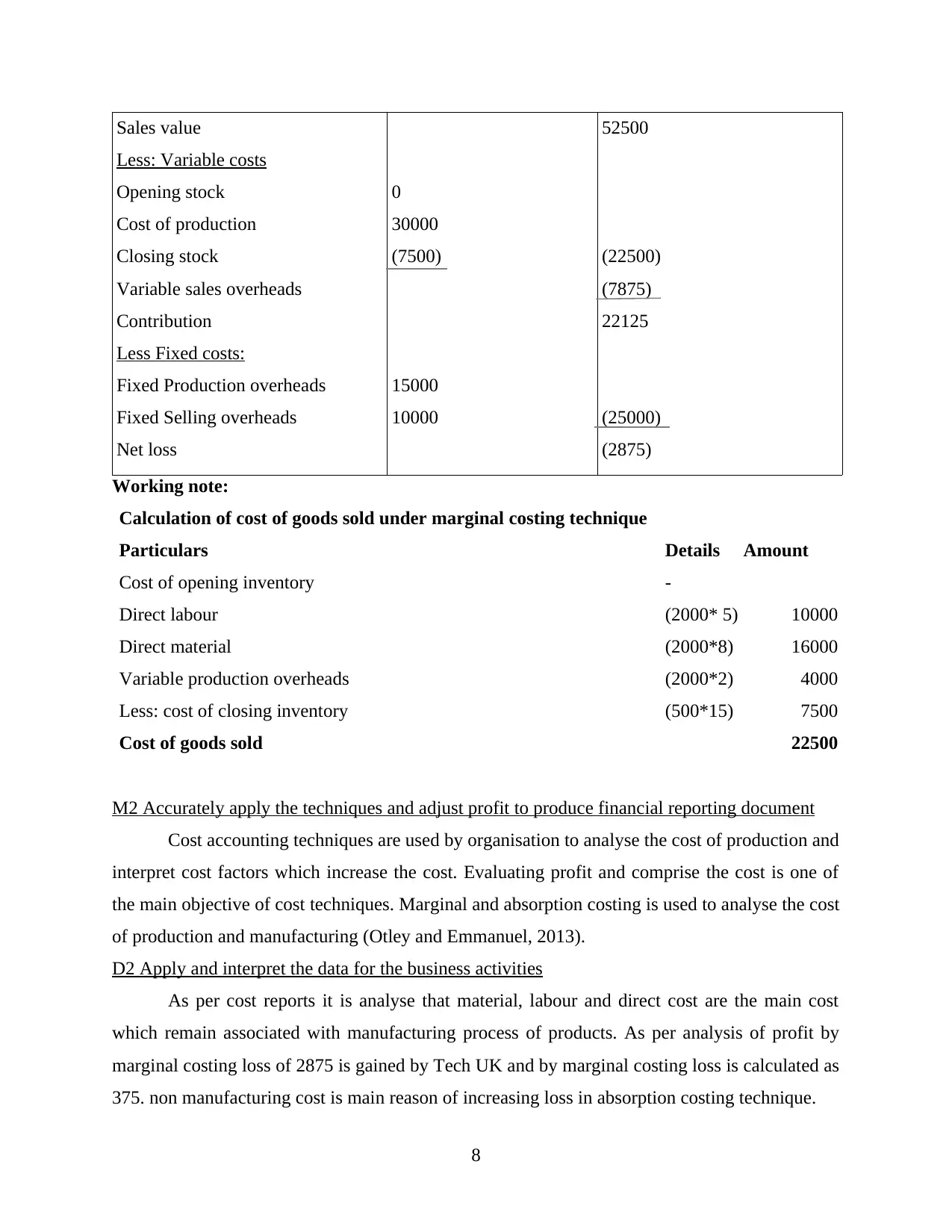
Sales value
Less: Variable costs
Opening stock
Cost of production
Closing stock
Variable sales overheads
Contribution
Less Fixed costs:
Fixed Production overheads
Fixed Selling overheads
Net loss
0
30000
(7500)
15000
10000
52500
(22500)
(7875)
22125
(25000)
(2875)
Working note:
Calculation of cost of goods sold under marginal costing technique
Particulars Details Amount
Cost of opening inventory -
Direct labour (2000* 5) 10000
Direct material (2000*8) 16000
Variable production overheads (2000*2) 4000
Less: cost of closing inventory (500*15) 7500
Cost of goods sold 22500
M2 Accurately apply the techniques and adjust profit to produce financial reporting document
Cost accounting techniques are used by organisation to analyse the cost of production and
interpret cost factors which increase the cost. Evaluating profit and comprise the cost is one of
the main objective of cost techniques. Marginal and absorption costing is used to analyse the cost
of production and manufacturing (Otley and Emmanuel, 2013).
D2 Apply and interpret the data for the business activities
As per cost reports it is analyse that material, labour and direct cost are the main cost
which remain associated with manufacturing process of products. As per analysis of profit by
marginal costing loss of 2875 is gained by Tech UK and by marginal costing loss is calculated as
375. non manufacturing cost is main reason of increasing loss in absorption costing technique.
8
Less: Variable costs
Opening stock
Cost of production
Closing stock
Variable sales overheads
Contribution
Less Fixed costs:
Fixed Production overheads
Fixed Selling overheads
Net loss
0
30000
(7500)
15000
10000
52500
(22500)
(7875)
22125
(25000)
(2875)
Working note:
Calculation of cost of goods sold under marginal costing technique
Particulars Details Amount
Cost of opening inventory -
Direct labour (2000* 5) 10000
Direct material (2000*8) 16000
Variable production overheads (2000*2) 4000
Less: cost of closing inventory (500*15) 7500
Cost of goods sold 22500
M2 Accurately apply the techniques and adjust profit to produce financial reporting document
Cost accounting techniques are used by organisation to analyse the cost of production and
interpret cost factors which increase the cost. Evaluating profit and comprise the cost is one of
the main objective of cost techniques. Marginal and absorption costing is used to analyse the cost
of production and manufacturing (Otley and Emmanuel, 2013).
D2 Apply and interpret the data for the business activities
As per cost reports it is analyse that material, labour and direct cost are the main cost
which remain associated with manufacturing process of products. As per analysis of profit by
marginal costing loss of 2875 is gained by Tech UK and by marginal costing loss is calculated as
375. non manufacturing cost is main reason of increasing loss in absorption costing technique.
8
Secure Best Marks with AI Grader
Need help grading? Try our AI Grader for instant feedback on your assignments.
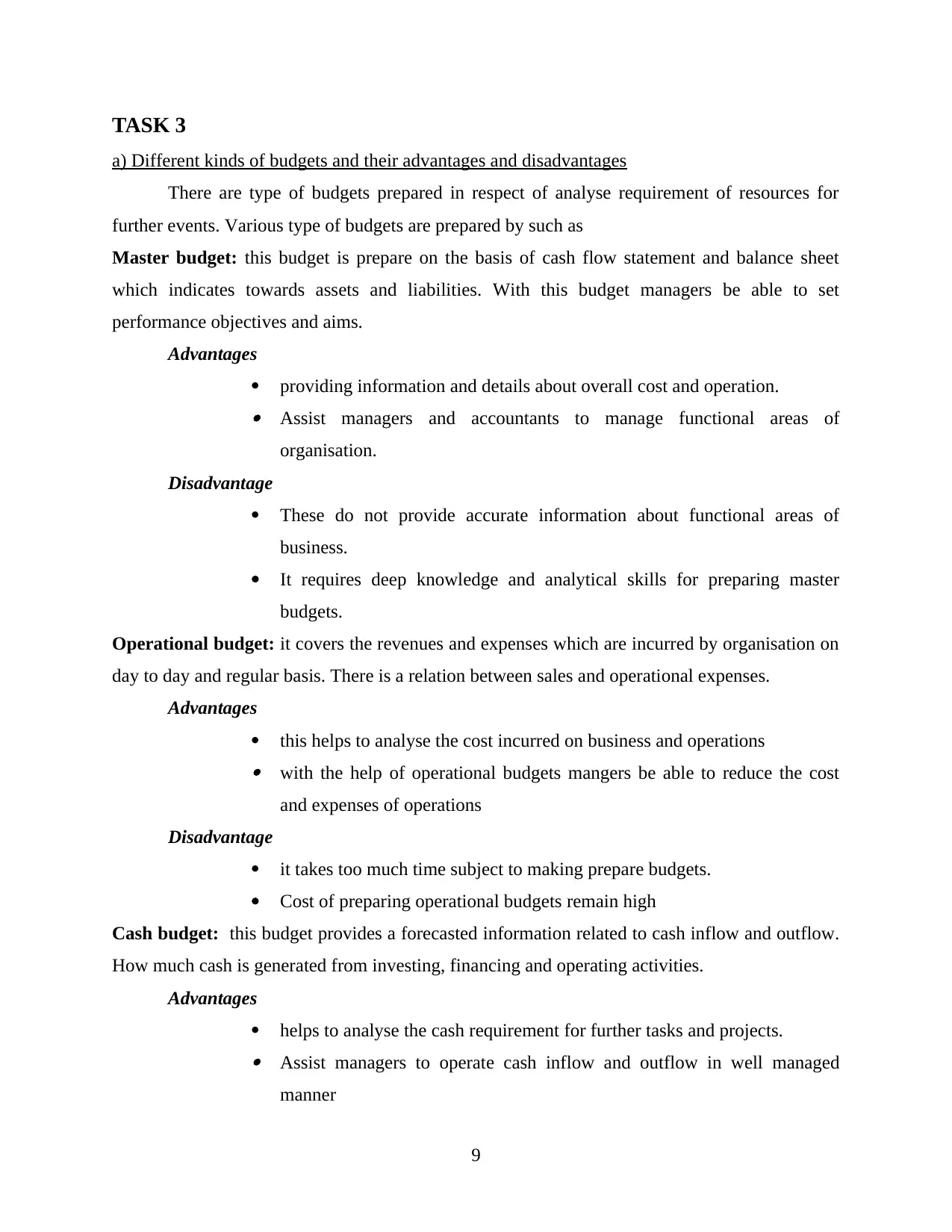
TASK 3
a) Different kinds of budgets and their advantages and disadvantages
There are type of budgets prepared in respect of analyse requirement of resources for
further events. Various type of budgets are prepared by such as
Master budget: this budget is prepare on the basis of cash flow statement and balance sheet
which indicates towards assets and liabilities. With this budget managers be able to set
performance objectives and aims.
Advantages
providing information and details about overall cost and operation.
Assist managers and accountants to manage functional areas of
organisation.
Disadvantage
These do not provide accurate information about functional areas of
business.
It requires deep knowledge and analytical skills for preparing master
budgets.
Operational budget: it covers the revenues and expenses which are incurred by organisation on
day to day and regular basis. There is a relation between sales and operational expenses.
Advantages
this helps to analyse the cost incurred on business and operations
with the help of operational budgets mangers be able to reduce the cost
and expenses of operations
Disadvantage
it takes too much time subject to making prepare budgets.
Cost of preparing operational budgets remain high
Cash budget: this budget provides a forecasted information related to cash inflow and outflow.
How much cash is generated from investing, financing and operating activities.
Advantages
helps to analyse the cash requirement for further tasks and projects.
Assist managers to operate cash inflow and outflow in well managed
manner
9
a) Different kinds of budgets and their advantages and disadvantages
There are type of budgets prepared in respect of analyse requirement of resources for
further events. Various type of budgets are prepared by such as
Master budget: this budget is prepare on the basis of cash flow statement and balance sheet
which indicates towards assets and liabilities. With this budget managers be able to set
performance objectives and aims.
Advantages
providing information and details about overall cost and operation.
Assist managers and accountants to manage functional areas of
organisation.
Disadvantage
These do not provide accurate information about functional areas of
business.
It requires deep knowledge and analytical skills for preparing master
budgets.
Operational budget: it covers the revenues and expenses which are incurred by organisation on
day to day and regular basis. There is a relation between sales and operational expenses.
Advantages
this helps to analyse the cost incurred on business and operations
with the help of operational budgets mangers be able to reduce the cost
and expenses of operations
Disadvantage
it takes too much time subject to making prepare budgets.
Cost of preparing operational budgets remain high
Cash budget: this budget provides a forecasted information related to cash inflow and outflow.
How much cash is generated from investing, financing and operating activities.
Advantages
helps to analyse the cash requirement for further tasks and projects.
Assist managers to operate cash inflow and outflow in well managed
manner
9
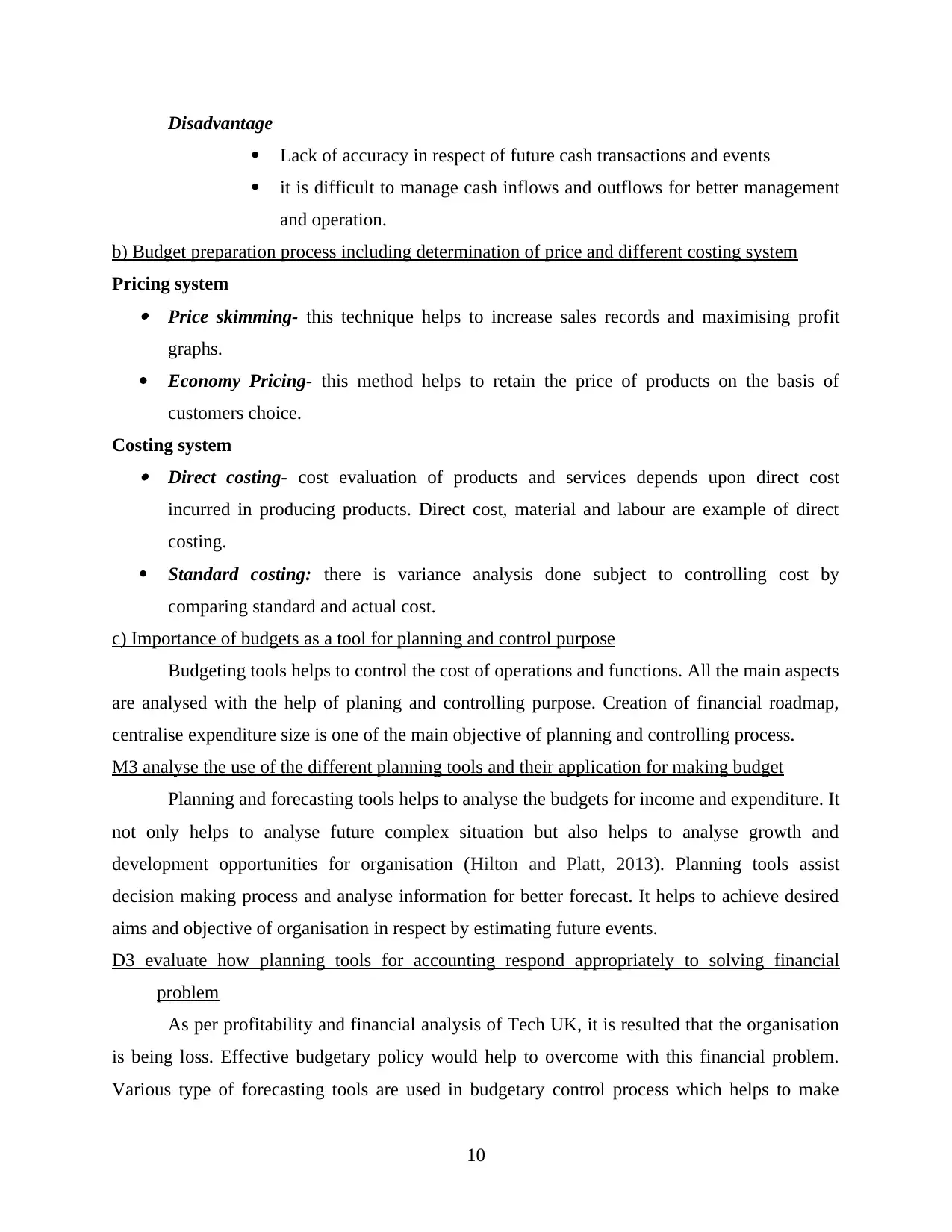
Disadvantage
Lack of accuracy in respect of future cash transactions and events
it is difficult to manage cash inflows and outflows for better management
and operation.
b) Budget preparation process including determination of price and different costing system
Pricing system Price skimming- this technique helps to increase sales records and maximising profit
graphs.
Economy Pricing- this method helps to retain the price of products on the basis of
customers choice.
Costing system Direct costing- cost evaluation of products and services depends upon direct cost
incurred in producing products. Direct cost, material and labour are example of direct
costing.
Standard costing: there is variance analysis done subject to controlling cost by
comparing standard and actual cost.
c) Importance of budgets as a tool for planning and control purpose
Budgeting tools helps to control the cost of operations and functions. All the main aspects
are analysed with the help of planing and controlling purpose. Creation of financial roadmap,
centralise expenditure size is one of the main objective of planning and controlling process.
M3 analyse the use of the different planning tools and their application for making budget
Planning and forecasting tools helps to analyse the budgets for income and expenditure. It
not only helps to analyse future complex situation but also helps to analyse growth and
development opportunities for organisation (Hilton and Platt, 2013). Planning tools assist
decision making process and analyse information for better forecast. It helps to achieve desired
aims and objective of organisation in respect by estimating future events.
D3 evaluate how planning tools for accounting respond appropriately to solving financial
problem
As per profitability and financial analysis of Tech UK, it is resulted that the organisation
is being loss. Effective budgetary policy would help to overcome with this financial problem.
Various type of forecasting tools are used in budgetary control process which helps to make
10
Lack of accuracy in respect of future cash transactions and events
it is difficult to manage cash inflows and outflows for better management
and operation.
b) Budget preparation process including determination of price and different costing system
Pricing system Price skimming- this technique helps to increase sales records and maximising profit
graphs.
Economy Pricing- this method helps to retain the price of products on the basis of
customers choice.
Costing system Direct costing- cost evaluation of products and services depends upon direct cost
incurred in producing products. Direct cost, material and labour are example of direct
costing.
Standard costing: there is variance analysis done subject to controlling cost by
comparing standard and actual cost.
c) Importance of budgets as a tool for planning and control purpose
Budgeting tools helps to control the cost of operations and functions. All the main aspects
are analysed with the help of planing and controlling purpose. Creation of financial roadmap,
centralise expenditure size is one of the main objective of planning and controlling process.
M3 analyse the use of the different planning tools and their application for making budget
Planning and forecasting tools helps to analyse the budgets for income and expenditure. It
not only helps to analyse future complex situation but also helps to analyse growth and
development opportunities for organisation (Hilton and Platt, 2013). Planning tools assist
decision making process and analyse information for better forecast. It helps to achieve desired
aims and objective of organisation in respect by estimating future events.
D3 evaluate how planning tools for accounting respond appropriately to solving financial
problem
As per profitability and financial analysis of Tech UK, it is resulted that the organisation
is being loss. Effective budgetary policy would help to overcome with this financial problem.
Various type of forecasting tools are used in budgetary control process which helps to make
10
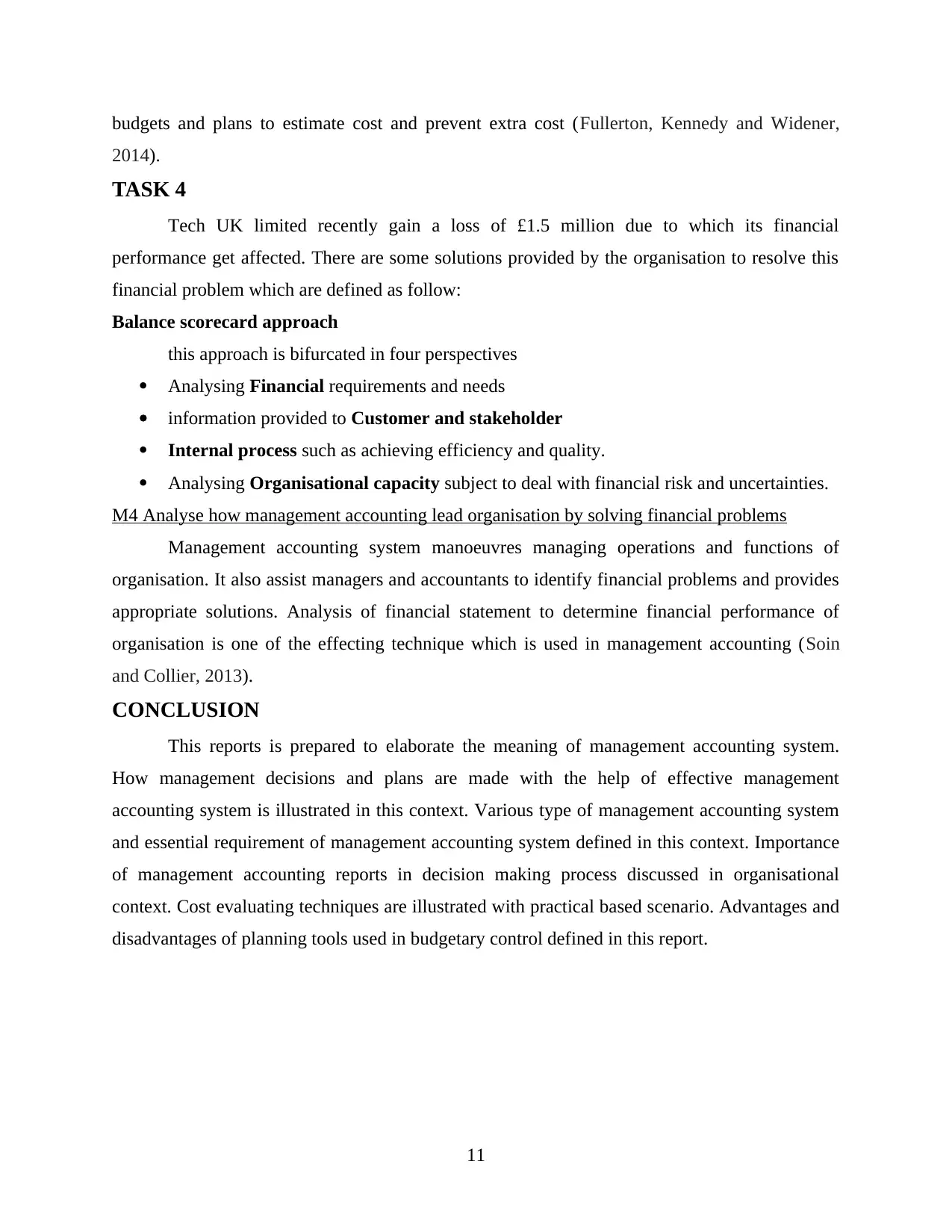
budgets and plans to estimate cost and prevent extra cost (Fullerton, Kennedy and Widener,
2014).
TASK 4
Tech UK limited recently gain a loss of £1.5 million due to which its financial
performance get affected. There are some solutions provided by the organisation to resolve this
financial problem which are defined as follow:
Balance scorecard approach
this approach is bifurcated in four perspectives
Analysing Financial requirements and needs
information provided to Customer and stakeholder
Internal process such as achieving efficiency and quality.
Analysing Organisational capacity subject to deal with financial risk and uncertainties.
M4 Analyse how management accounting lead organisation by solving financial problems
Management accounting system manoeuvres managing operations and functions of
organisation. It also assist managers and accountants to identify financial problems and provides
appropriate solutions. Analysis of financial statement to determine financial performance of
organisation is one of the effecting technique which is used in management accounting (Soin
and Collier, 2013).
CONCLUSION
This reports is prepared to elaborate the meaning of management accounting system.
How management decisions and plans are made with the help of effective management
accounting system is illustrated in this context. Various type of management accounting system
and essential requirement of management accounting system defined in this context. Importance
of management accounting reports in decision making process discussed in organisational
context. Cost evaluating techniques are illustrated with practical based scenario. Advantages and
disadvantages of planning tools used in budgetary control defined in this report.
11
2014).
TASK 4
Tech UK limited recently gain a loss of £1.5 million due to which its financial
performance get affected. There are some solutions provided by the organisation to resolve this
financial problem which are defined as follow:
Balance scorecard approach
this approach is bifurcated in four perspectives
Analysing Financial requirements and needs
information provided to Customer and stakeholder
Internal process such as achieving efficiency and quality.
Analysing Organisational capacity subject to deal with financial risk and uncertainties.
M4 Analyse how management accounting lead organisation by solving financial problems
Management accounting system manoeuvres managing operations and functions of
organisation. It also assist managers and accountants to identify financial problems and provides
appropriate solutions. Analysis of financial statement to determine financial performance of
organisation is one of the effecting technique which is used in management accounting (Soin
and Collier, 2013).
CONCLUSION
This reports is prepared to elaborate the meaning of management accounting system.
How management decisions and plans are made with the help of effective management
accounting system is illustrated in this context. Various type of management accounting system
and essential requirement of management accounting system defined in this context. Importance
of management accounting reports in decision making process discussed in organisational
context. Cost evaluating techniques are illustrated with practical based scenario. Advantages and
disadvantages of planning tools used in budgetary control defined in this report.
11
Paraphrase This Document
Need a fresh take? Get an instant paraphrase of this document with our AI Paraphraser
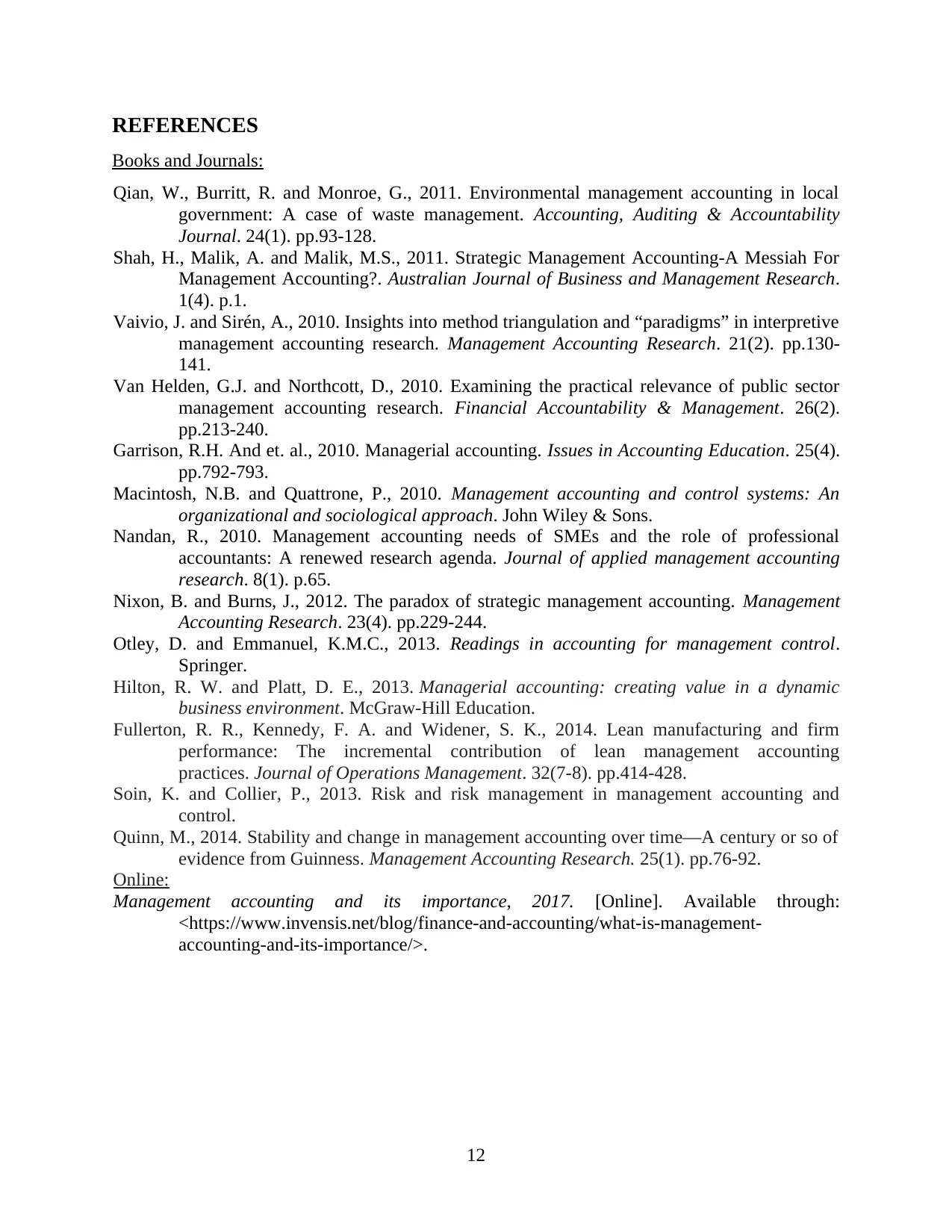
REFERENCES
Books and Journals:
Qian, W., Burritt, R. and Monroe, G., 2011. Environmental management accounting in local
government: A case of waste management. Accounting, Auditing & Accountability
Journal. 24(1). pp.93-128.
Shah, H., Malik, A. and Malik, M.S., 2011. Strategic Management Accounting-A Messiah For
Management Accounting?. Australian Journal of Business and Management Research.
1(4). p.1.
Vaivio, J. and Sirén, A., 2010. Insights into method triangulation and “paradigms” in interpretive
management accounting research. Management Accounting Research. 21(2). pp.130-
141.
Van Helden, G.J. and Northcott, D., 2010. Examining the practical relevance of public sector
management accounting research. Financial Accountability & Management. 26(2).
pp.213-240.
Garrison, R.H. And et. al., 2010. Managerial accounting. Issues in Accounting Education. 25(4).
pp.792-793.
Macintosh, N.B. and Quattrone, P., 2010. Management accounting and control systems: An
organizational and sociological approach. John Wiley & Sons.
Nandan, R., 2010. Management accounting needs of SMEs and the role of professional
accountants: A renewed research agenda. Journal of applied management accounting
research. 8(1). p.65.
Nixon, B. and Burns, J., 2012. The paradox of strategic management accounting. Management
Accounting Research. 23(4). pp.229-244.
Otley, D. and Emmanuel, K.M.C., 2013. Readings in accounting for management control.
Springer.
Hilton, R. W. and Platt, D. E., 2013. Managerial accounting: creating value in a dynamic
business environment. McGraw-Hill Education.
Fullerton, R. R., Kennedy, F. A. and Widener, S. K., 2014. Lean manufacturing and firm
performance: The incremental contribution of lean management accounting
practices. Journal of Operations Management. 32(7-8). pp.414-428.
Soin, K. and Collier, P., 2013. Risk and risk management in management accounting and
control.
Quinn, M., 2014. Stability and change in management accounting over time—A century or so of
evidence from Guinness. Management Accounting Research. 25(1). pp.76-92.
Online:
Management accounting and its importance, 2017. [Online]. Available through:
<https://www.invensis.net/blog/finance-and-accounting/what-is-management-
accounting-and-its-importance/>.
12
Books and Journals:
Qian, W., Burritt, R. and Monroe, G., 2011. Environmental management accounting in local
government: A case of waste management. Accounting, Auditing & Accountability
Journal. 24(1). pp.93-128.
Shah, H., Malik, A. and Malik, M.S., 2011. Strategic Management Accounting-A Messiah For
Management Accounting?. Australian Journal of Business and Management Research.
1(4). p.1.
Vaivio, J. and Sirén, A., 2010. Insights into method triangulation and “paradigms” in interpretive
management accounting research. Management Accounting Research. 21(2). pp.130-
141.
Van Helden, G.J. and Northcott, D., 2010. Examining the practical relevance of public sector
management accounting research. Financial Accountability & Management. 26(2).
pp.213-240.
Garrison, R.H. And et. al., 2010. Managerial accounting. Issues in Accounting Education. 25(4).
pp.792-793.
Macintosh, N.B. and Quattrone, P., 2010. Management accounting and control systems: An
organizational and sociological approach. John Wiley & Sons.
Nandan, R., 2010. Management accounting needs of SMEs and the role of professional
accountants: A renewed research agenda. Journal of applied management accounting
research. 8(1). p.65.
Nixon, B. and Burns, J., 2012. The paradox of strategic management accounting. Management
Accounting Research. 23(4). pp.229-244.
Otley, D. and Emmanuel, K.M.C., 2013. Readings in accounting for management control.
Springer.
Hilton, R. W. and Platt, D. E., 2013. Managerial accounting: creating value in a dynamic
business environment. McGraw-Hill Education.
Fullerton, R. R., Kennedy, F. A. and Widener, S. K., 2014. Lean manufacturing and firm
performance: The incremental contribution of lean management accounting
practices. Journal of Operations Management. 32(7-8). pp.414-428.
Soin, K. and Collier, P., 2013. Risk and risk management in management accounting and
control.
Quinn, M., 2014. Stability and change in management accounting over time—A century or so of
evidence from Guinness. Management Accounting Research. 25(1). pp.76-92.
Online:
Management accounting and its importance, 2017. [Online]. Available through:
<https://www.invensis.net/blog/finance-and-accounting/what-is-management-
accounting-and-its-importance/>.
12
1 out of 14
Related Documents
Your All-in-One AI-Powered Toolkit for Academic Success.
+13062052269
info@desklib.com
Available 24*7 on WhatsApp / Email
![[object Object]](/_next/static/media/star-bottom.7253800d.svg)
Unlock your academic potential
© 2024 | Zucol Services PVT LTD | All rights reserved.





